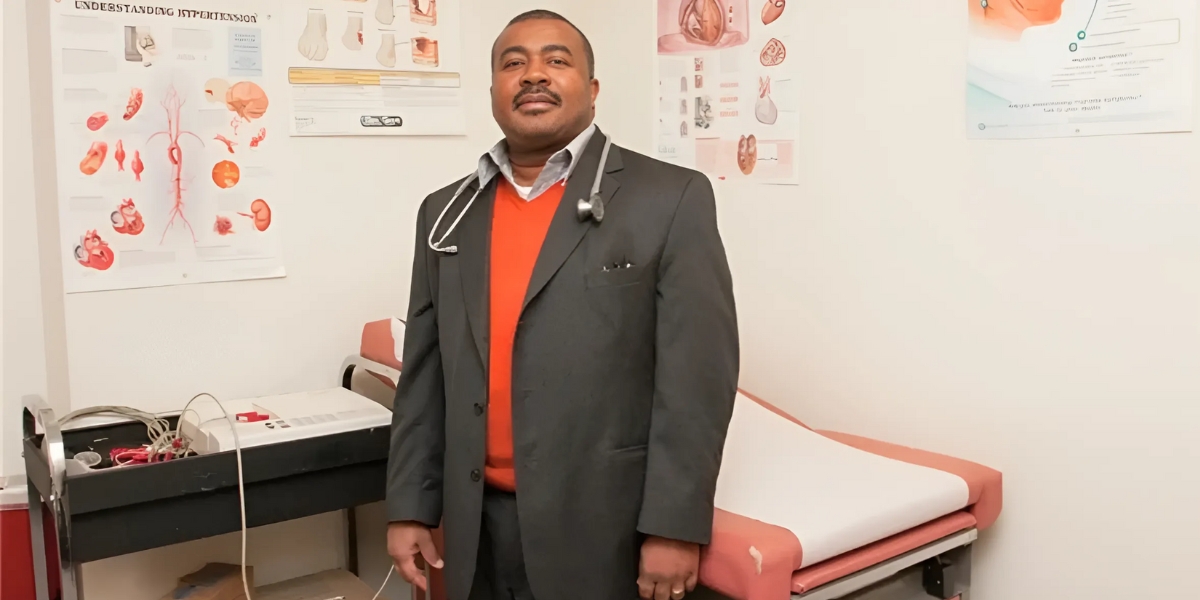By: Kane William
Dr. Ebenezer Quainoo has built his medical practice on a simple but powerful foundation. For more than two decades, the board-certified internist has served patients in Baltimore, Maryland, combining clinical knowledge and skill with genuine compassion. His approach to medicine extends far beyond diagnosis and treatment.
“My guiding principle is that medicine is not just science,” Dr. Quainoo says. “It is service. This helps me approach each patient with empathy and every challenge with integrity. It reminds me that healing begins long before the prescription is written.”
This philosophy influences every aspect of his work at Baltimore Healthcare PC, where he serves as founder and primary care provider. Ebenezer Quainoo, M.D., offers a broad range of medical services that include primary care, addiction medicine, weight loss treatment, and IV nutrient infusions. His practice reflects his focus on treating the whole person, not just the symptoms.
The physician’s credentials reflect his commitment to high standards. He maintains board certification in internal medicine and holds a Healthcare Quality and Management Certification. His affiliation with the University of Maryland Medical Center supports his efforts to maintain high-quality care. As a Clinical Assistant Professor at the International American University of Medicine, Dr. Quainoo also contributes to medical education, sharing his knowledge with the next generation of physicians.
His skillset spans advanced medical procedures, including musculoskeletal ultrasound, arthrocentesis, central venous line placement, lumbar puncture, abdominal paracentesis, and thoracentesis. These technical skills, combined with his patient-centered approach, enable him to provide comprehensive care for complex medical conditions.
Dr. Ebenezer Quainoo Builds Trust Through Patient-Centered Medicine
Ebenezer Quainoo, M.D., has developed a strong reputation for managing chronic conditions such as arthritis, hypertension, and bronchitis. His approach emphasizes building lasting relationships with patients, understanding their individual needs, and creating treatment plans that address both immediate concerns and long-term health goals.
“What keeps me grounded is the transformational power of patient care,” he says. “Every time I see a patient recover, whether from addiction, chronic illness, or acute distress, I’m reminded why I chose this path. My faith, my family, and my commitment to providing dignity through medicine keep me focused through the pressures of clinical and administrative work.”
This patient-centered philosophy has guided Dr. Quainoo through years of practice. He recalls one particularly meaningful case that exemplifies his approach to medicine. “Helping a critically ill patient recover from acute renal failure and rhabdomyolysis until they could walk out of rehab stands out to me,” he says. “That experience reminded me that medicine is about transformation, not just treatment.”
His commitment to comprehensive care extends to addiction medicine, an area where he notices a significant need in the Baltimore community. Dr. Quainoo approaches addiction treatment with the same compassion and scientific rigor he brings to all aspects of medicine, recognizing that successful treatment often requires addressing both the physical and psychological components of the disease.
Overcoming Challenges in a Complex Healthcare Landscape
Running a private practice in Baltimore presents various challenges, and Ebenezer Quainoo, M.D., navigates them with resilience. Balancing patient care with administrative demands, such as insurance hurdles and staffing, requires careful planning. “Each decision requires ethical precision,” he says, particularly when addressing issues like the opioid crisis or expanding services.
A notable challenge came when Dr. Quainoo worked with a middle-aged patient with uncontrolled Type 2 diabetes who refused insulin. By engaging in open dialogue and offering a compromise with oral medication, he built trust, which ultimately led the patient to accept insulin after a follow-up. Reflecting on the experience, he noted he would now involve a diabetes educator earlier to provide additional support.
Recruiting and retaining qualified staff remains an ongoing hurdle, but Dr. Quainoo sees this as an opportunity to grow his practice’s impact. By fostering a collaborative environment and investing in staff development, he works toward ensuring that Baltimore Healthcare PC continues to meet the community’s needs.
Embracing Innovation While Maintaining Human Connection
The healthcare landscape continues to evolve rapidly, and Dr. Quainoo stays current with emerging trends and technologies.
“I find the increased integration of holistic approaches and data-driven care particularly encouraging,” he says. “Combining lifestyle medicine, behavioral health, and evidence-based treatments provides a more comprehensive view of patient wellness. We’re also seeing AI and remote monitoring emerging in ways that can improve access and outcomes.”
Despite his enthusiasm for technological advances, Dr. Quainoo maintains that the physician-patient relationship remains central to effective healthcare. He believes that technology should complement, not replace, the human connection that forms the foundation of healing.
Ebenezer Quainoo, M.D., envisions significant changes in how internal medicine practices will operate in the coming years. He foresees a movement toward hybrid models that combine traditional in-person care with innovative delivery methods.
“I believe we’ll see more private practices adopting hybrid models; combining in-person care with telemedicine and personalized management of chronic diseases,” he says. “Practices will continue to serve as critical access points for preventive care, especially in underserved communities. The physician-patient relationship will remain at the center of it all.”
This vision reflects his understanding that healthcare delivery must evolve to meet changing patient needs and expectations. Dr. Quainoo believes that successful practices will be those that can adapt to new technologies while maintaining the personal touch that defines quality healthcare.
His commitment to serving underserved communities aligns with his broader vision of healthcare equity. Through his practice, he strives to ensure that comprehensive medical care remains accessible to all patients, regardless of their background or circumstances.
He also prioritizes preventive care, which he sees as vital for addressing health disparities in the region. His practice incorporates various innovative approaches, including IV nutrient infusions and comprehensive weight loss programs. These services reflect his commitment to preventive medicine and his understanding that optimal health requires attention to nutrition, lifestyle, and overall wellness.
His forward-thinking approach emphasizes the role of private practices as access points for underserved populations. By combining technology with a human-centered approach, he seeks to contribute to making healthcare more equitable and effective.
Dr. Ebenezer Quainoo Urges Future Physicians to Lead and Think Strategically in Medicine
Dr. Ebenezer Quainoo’s advice to medical students and young physicians reflects this mindset. “Keep the patient at the center of every decision,” he says. He also encourages aspiring doctors to learn the business side of medicine early and seek mentorship to navigate the complexities of independent practice. These lessons, drawn from his own experience, highlight the importance of blending clinical competence with strategic thinking.
Dr. Quainoo’s early career was shaped by a mentor who guided him into private practice, helping him transition from residency to running a medical office. This experience taught him the value of leadership and advocacy, qualities he now instills in his students at the International American University of Medicine.
Looking back on his career, Dr. Quainoo reflects on lessons learned and insights gained. “I would have embraced leadership and practice management responsibilities earlier,” he says. “Clinical excellence alone isn’t enough; you must also be an advocate, an educator, and a strategic thinker to grow a sustainable, impactful practice.”
Serving Baltimore’s Diverse Community
Baltimore holds special significance for Dr. Quainoo, who sees the city as an ideal place to practice medicine and make a meaningful difference in people’s lives. The community’s diversity and resilience inspire his commitment to providing quality healthcare.
“Baltimore is a city with resilience at its core,” he says. “The healthcare needs are diverse, the stories are rich, and the opportunity to make a lasting difference is immense. Building trust and providing quality care is both humbling and vital here.”
This connection to his community extends beyond his medical practice. Dr. Quainoo maintains a strong commitment to service through his involvement with Mission 195, which allows him to give back globally through medical outreach and spiritual support. This broader perspective on service reinforces his dedication to his local community.
His advice to medical students and young physicians reflects his understanding of medicine as both a profession and a calling. “Independent practice offers freedom, but it also comes with great responsibility,” he says. “Medicine is a service rooted in humility, curiosity, and compassion.”
Dr. Quainoo’s commitment to advancing healthcare quality and improving patient outcomes continues to drive his work in the Baltimore community. Through his comprehensive approach to medicine, professional development, and community service, Dr. Ebenezer Quainoo exemplifies the qualities that define exceptional healthcare providers.
The physician’s journey demonstrates that successful medical practice requires more than technical skill and knowledge. It demands compassion, business acumen, adaptability, and an unwavering commitment to serving others. As healthcare continues to evolve, Dr. Quainoo’s approach offers a model for maintaining the human connection that remains at the heart of healing.
His story reminds us that behind every successful medical practice is a physician who sees patients not as cases to be solved, but as individuals deserving of dignity, respect, and comprehensive care. In Baltimore and beyond, this approach to medicine continues to transform lives and strengthen communities.









